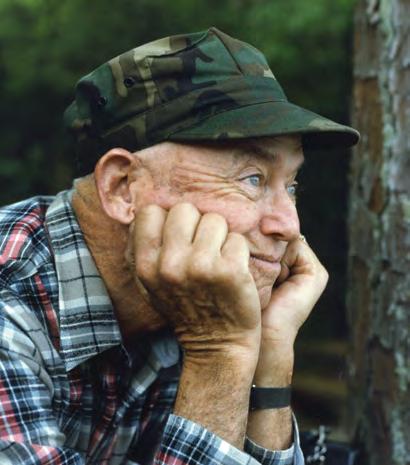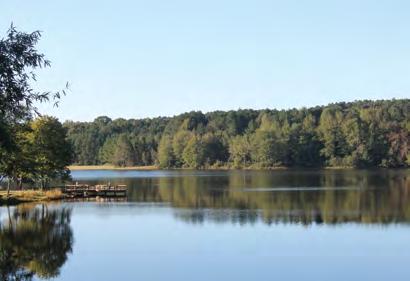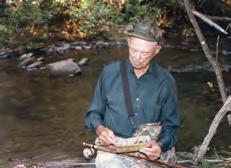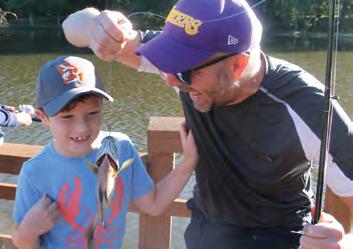
8 minute read
Living Out a Legacy
Living Out a Legacy by DAVID ROTEN
More than 400,000 people have participated in Charlie Elliott Wildlife Center programs since it opened in 1995, fulfilling the vision of its namesake.
Advertisement
Progress, it seems, comes with a price. Though the Industrial Revolution and later technological advances resulted in many benefits to society, no doubt some things have been diminished—or lost altogether—in the process. One is the appreciation of nature. Another is the preservation of it. For Charles Newton Elliott, a Georgia icon of nature and conservation, the first inexorably led to the second.
In fact, it is next to impossible to overstate the impact the late Elliott had—and continues to have—on natural resources conservation and wildlife preservation, both in the state of Georgia and nationally. Throughout his life, Elliott’s deep love of the outdoors found its joyful expression through hunting, fishing or just sitting in the woods. His professional accomplishments are a testimony to that devotion. Dating from the late 1920s, his resume is impressive. A few of the positions he held: first director of state parks in Georgia, commissioner of natural resources department, first director of game and fish commission in Georgia, field editor for Outdoor Life magazine and outdoor editor for the Atlanta Constitution.
Kim Morris-Zarneke is the senior program manager at the Charlie Elliott Wildlife Center, located just south of Mansfield. She believes a key to Elliott’s success in promoting wildlife conservation throughout his career were the friendships he made along the way with those who
were able to introduce him to “movers and shakers”—people like Coca-Cola magnate and philanthropist Robert Woodruff and then-Gov. Jimmy Carter.
“He created networks and connections he often relied on to get him through his career,” said Morris-Zarneke, pointing out that Elliott’s passion fueled his purpose and his vision. “He loved to hunt [and] he loved to fish, but at the same time, he liked connecting people with nature and getting them to understand the need for management.”
Run by the Wildlife Resources Division of the Georgia Department of Natural Resources, the CEWC continues to fulfill Elliott’s vision by offering a multitude of recreational and educational opportunities through various programs and services. The choices for visitors are seemingly as varied and numerous as the flora and fauna that abound in the 6,400 acres that make up the center, the Clybel Wildlife Management Area and the Marben Public Fishing Area.
“You have three natural wildlife entities working together to manage an area,” Morris-Zarneke said. “We work with fisheries and game management.”
Family Public Programs are usually free on Saturdays and cover a variety of natural history and outdoor recreation topics. A number of programs are scheduled for the coming months:
FEBRUARY Brooke Agre Open House Here you can explore the ecoregions of Georgia and the wildlife that can be found there. It includes live animals and interactive stations.
MARCH Intro to Backpacking Participants will be taught methods and techniques in preparing to backpack on day, overnight and extended trips into the wild.
APRIL Night Hike with Astronomy Take a night walk through the woods and “discover what animals do when it’s dark.” Afterwards, do some stargazing and learn about constellations in the Jon Wood Astronomy Field.
MAY Keeping Georgia Wild Day. Morris-Zarneke calls it “our big family festival day to get people excited about the outdoors.” As the program description states, “Kids can try their hand at archery, fishing, shooting sports and mini boat rides led by a Conservation Ranger.” Wildlife presentations and exhibits, along with face painting, add to the fun.
Kim Morris-Zarneke, Charlie Elliott Wildlife Center Senior Program Manager


SNOW DAY SURVIVAL GUIDE FOR PARENTS
Here in the South, snow days are magical. My three kids love bundling up—in eight layers of clothes—and going out to have snowball fights, build tiny snowmen and make snow angels, all of which lasts about an hour, tops. They come in wet, cold, hungry and ready for hot chocolate. Then comes the inevitable chorus of “I’m bored!” This winter, let’s be ready with some fun ideas to keep our cooped-up kids busy—and keep us sane—should the snow days come.
BUILD A BLANKET FORT
Stock it with their favorite books and snacks, and spend the day cuddling.
HAVE A MOVIE MARATHON
What better way to pass the time in a blanket fort. Whether it’s “Harry Potter,” “Star Wars” or “Indiana Jones,” snow days are the perfect excuse to binge-watch a favorite series.
GAME TIME!
Dust off the deck of cards and board games. For something a little more high-energy, play hide and seek, Simon says, the floor is lava or balloon volleyball.
GET CRAFTY
Pass the time crafting hand-cut snowflakes out of paper or coffee filters, or have a go at one of the projects you have pinned but never seem to have time to try.
MAKE SNOW CREAM
Mix together one cup of milk, 1/3 cup of granulated sugar, one teaspoon of vanilla extract, a pinch of salt and eight cups of clean snow. Enjoy.
The Charlie Elliott Wildlife Center offers three different School Programs, all of which align to Georgia Standards of Excellence. CEWC officials take one of these programs on the road, bringing their unique wildlife education experience to schools and groups within a 90-minute radius of the center.
For groups, clubs or companies wishing to team build or simply enjoy outdoor recreation, there is the Wildlife and Other Wonders Outdoors Program. Guests can build their own game plan from multiple activities, according to their interests and needs. It includes canoeing, fishing, archery, firearms, outdoor skills and more.
CEWC is also the state coordinator for Project Wild, an international curriculum devoted to natural resources management. Educators attend workshops for professional development in areas related to wildlife and the environment. Meanwhile, the Becoming an Outdoors Woman Program offers hands-on workshops for women who, whether novice or expert, want to develop hunting, fishing, boating, shooting and other outdoor skills.
Since the Charlie Elliott Wildlife Center opened in 1995, more than 400,000 people have participated in its programs.
“The whole idea is fulfilling that vision that Charlie had about getting people outside, getting them engaged in nature,” Morris-Zarneke said. “It’s a vision that is shared by all who work here. We are all bound by this bigger idea of conserving this place for future generations.”
It was a simple concept with profound implications: “Enjoy the outdoors and take care of it so others can enjoy it, too.” Charlie Elliott, who died in 2000, spent his time on Earth living it out. He may have been thinking of one of his many big-game hunts when, late in life, he offered this blessing: “I wish for you a long life outdoors—one that is filled with as much drama, humor and suspense as the one I have survived.”

Located at 543 Elliott Trail in Mansfield, the Charlie Elliott Wildlife Center is open Monday through Saturday, from 9 a.m. to 4:30 p.m.
For more information, visit georgiawildlife.com/charlieelliott or call 770-784-3059.
4 IMPORTANT TIPS
to Properly Prepare Your Turf for the Spring
1
2
3
4 Do Not Aerate Until After the Last Frost
There are several benefits to aerating warm-season Georgia grasses such as bermuda, zoysia and centipede. However, many homeowners in Newton County are aerating their yards too early in the year. Aerations penetrate the soil one inch deep under the surface of the turf, breaking up old roots to allow new root growth. That means that these new roots are exposed to the elements. If there is a deep frost on these undeveloped roots, the entire yard could be in jeopardy of being devastated. Aerations should not be done until after the last frost of the season, which is usually—and fittingly— around April 15 in Newton County.
Preemergent Applications
Now is the time to begin applying preemergent to the turf for the prevention of crabgrass, dandelions, clovers and other broadleaf weeds. Homeowners need to make sure that the preemergent is applied before the weeds have a chance to germinate. Wait too long and it will be a constant battle against seasonal weeds. Remember, an ounce of prevention is worth a pound of cure.
Prepare the Lawnmower
The lawnmower in a homeowner’s garage or shed has probably been hibernating over the winter like a black bear. Proper basic maintenance is required before beginning the cutting season. Changing the lawnmower’s oil is the most needed and obvious step to take, but there is more maintenance that can save you money in the long run. Remove any gas that had been sitting over the winter. Your lawnmower’s carburetor will thank you. Sharpen or buy new blades before the first mowing of the season. Dull blades will shred the tips of the grass blades making the turf more vulnerable to diseases.
Do Not Fertilize Too Early
Newton County residents love green grass, but many are too anxious and hurry the process by applying fertilizer before the ground is ready. Fertilizer, particularly nitrogen, should not be applied to the turf until the soil temperatures reach 65 degrees. Applying fertilizer too early can lead to a diseased turf and cause damage that could cost homeowners greatly. Soil temperatures in Newton County can be monitored by checking the website www.georgiaweather.net. This site is run by the University of Georgia and has a station right here in Newton County. For any further information or help with your landscaping needs, please contact ArtScape Lawn and Turf Professionals at 770-922-TURF(8873), or check out our website at art-scape-inc.com.

Updates and alerts can be found at ArtScape Lawn and Turf’s Facebook page. Search @artscapelawn.









